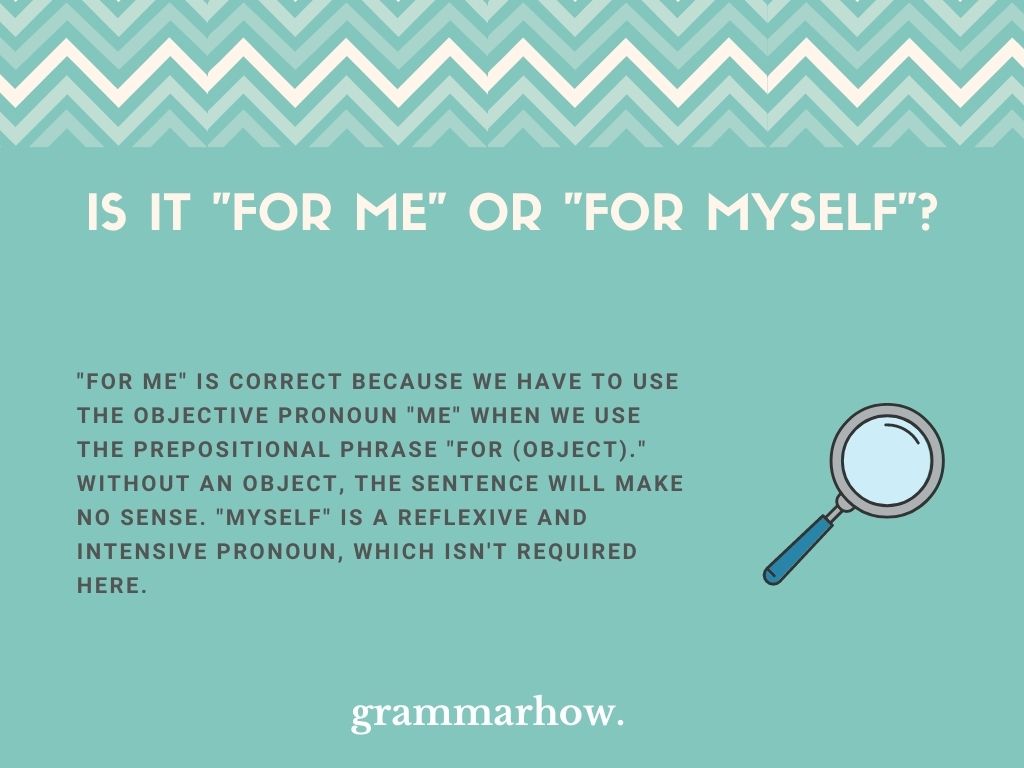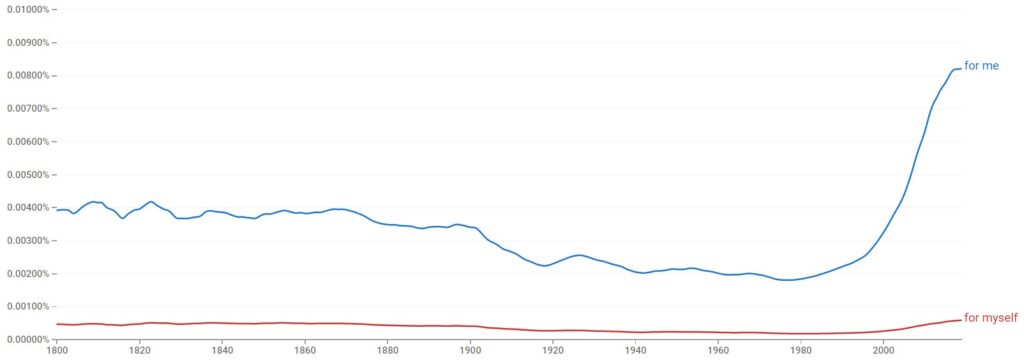Knowing the difference between the pronouns “me” and “myself” will help you to understand more about English and its inner workings. This article will look at using “for me” and “for myself” and help you to understand which of the two is correct.
Is It “For Me” Or “For Myself”?
“For me” is correct because we have to use the objective pronoun “me” when we use the prepositional phrase “for (object).” Without an object, the sentence will make no sense. “Myself” is a reflexive and intensive pronoun, which isn’t required here.

Once we understand the key differences between object pronouns and reflexive pronouns, we’ll have a much easier time with this rule. There are very few times where “myself” will work in place of “me,” and there are no cases where this applies when using “for.”
Is It Ever Correct To Use “For Myself”?
It is never correct to use “for myself” because “myself” is the wrong pronoun choice. If anyone uses it, it’s most likely due to a mistake or confusion about what the language rules are.
Generally, a native speaker will look at a sentence that says “for myself” and think that someone has made an error (most likely because they are not native speakers themselves). However, this error can also occur even for seasoned native writers if they don’t know how objects work.
For example:
- For myself, I couldn’t think of anything better.
This is an incorrect sentence structure, and we’re using the wrong pronoun of “me” here to describe it. It looks jarring and clunky and feels unnatural if you were to say it aloud.
How Much Is “For Me” And “For Myself” Used?
To illustrate the correctness of “for me” over “for myself,” some visual statistics might do the trick. We’ve got a graph from Google Ngram Viewer that clearly shows the differences in usage between the two.

“For me” is by far the most popular choice, and it has only grown in popularity in the last few decades. “For myself” has seen some usage over time, but it’s only ever related to errors or misinterpretations of English rules.
According to Google, “For Me” is mentioned 141,000 times on The New York Times website, while “For Myself” is mentioned 14,900 times.
Using the information above, we can see that, while “for myself” is never correct, that doesn’t mean native speakers avoid using it. Sometimes, they’ll do so thinking that it’s correct (or potentially the more formal option), but this is not the case.
Examples Of How To Use “For Me” In A Sentence
We feel like it’s time to show you some examples of “for me” in use. That way, you’ll know what we’re talking about when we’re using it, and you’ll have a much better understanding of how to use it yourself.
- For me, it wasn’t the performance that I was expecting.
- For me, I wasn’t entirely sure that it held up compared to the reviews.
- For me, this was easily the happiest time in my life.
- For me, you’ve always been slightly more intolerable than I’ve told you.
- For me, it’s hard to make new friends, which is why I cling so tightly to my old ones.
- For me, there is nothing better than a nice warm bath on a cold winter’s night.
- For me, people need to stop treading on each other’s toes and just let everyone shine in their own spotlight.
- For me, a four-day workweek with minimal hours is ideal, which is why I choose to work from home.
- For me, there isn’t much I wouldn’t do for a nice hot meal at the end of the day.
- For me, there is nothing worse than meeting up with people who you used to respect but have now come to despise.
“For me” works when we want to share something that impacts or changes our opinion about something. While other people might disagree with us, “for me” is a great way to show how our opinions are different and what makes us feel good or bad.
We can use “for me” to express both positive and negative emotions, depending on the context of the sentence. It’s a really useful way to do so, as people will understand that you’re about to share an opinion with them when you use it.
Again, the only correct form is “for me,” and “for myself” would not work synonymously in the same way because the pronoun choice is incorrect.
Is It Ever Correct To Use “For I”?
While “for (object)” requires an objective pronoun like “me,” there are some edge cases where “for I” might also work. However, in these cases, we’re using “for” in a much different way.
“For I” is only correct when “for” is used synonymously with “because” to explain a reason for something. “I” is a subjective pronoun, which is why it works with “for” when it means “because.”
- For I am free from prison, I’m going to make amends for the things I did.
- For I was late to the party, I’ll make sure to bring all the beer you require!
It’s an archaic form of writing, but it can still work in certain cases.
Is It “For Myself” Or “To Myself”?
“For myself” is never correct, and you should never use it at the start of a sentence. However, at the end of a sentence, if you’ve already included a subject like “I,” we can use “for myself” to show that we’ve got ourselves something. “To myself” works if we’ve sent something out.
- I bought this for myself.
- I sent this to myself so that I wouldn’t forget.
“For Me” – Synonyms
Finally, it might help you to go over some synonyms and alternatives to the phrase. That way, you’ll be able to expand your vocabulary a little better by trying out one of these:
- In my opinion
- I for one
- I myself
- I personally
- In my view
- In my honest opinion
- In my eyes
- I think that
You may also like:
Is “I Personally” Correct? Grammar Rules & Meaning Explained
“To Me” or “For Me” – Correct Version (Expressing An Opinion)

Martin holds a Master’s degree in Finance and International Business. He has six years of experience in professional communication with clients, executives, and colleagues. Furthermore, he has teaching experience from Aarhus University. Martin has been featured as an expert in communication and teaching on Forbes and Shopify. Read more about Martin here.
